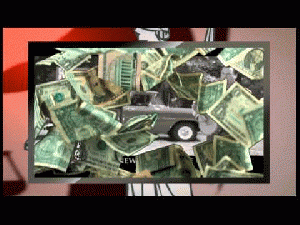Reprinted from WSWS
The 2016 US presidential election will be the most expensive in history, costing an estimated $10 billion, when all spending by candidates, the Democratic and Republican parties, super PACs and other corporate lobbies and trade unions is tabulated.
The vast sums being raised and spent by the Democratic and Republican candidates make a mockery of the claims that the United States is a democracy in which the people rule. It is big money that rules, dominating the entire process of selecting the candidates of the only two officially recognized parties and effectively determining the outcome of the vote on November 8, 2016.
Of the $390 million raised so far, $300 million has gone to the 15 announced candidates for the Republican presidential nomination, while $90 million has gone to four Democrats -- $71.5 million of that to the Democratic front-runner Hillary Clinton. The disparity is misleading: once the primary contest is over, and a Republican is selected to face Clinton, there will be billions spent on each side in the general election campaign.
The role of big money in the presidential campaign has become so obvious that even the corporate-controlled media can't cover it up any longer. The Washington Post, for example, published a report July 16 whose headline left little to the imagination: "2016 fundraising shows power tilting to groups backed by wealthy elite." The article noted that "independent" expenditures by so-called super PACs -- political action committees loosely linked to the candidates -- would for the first time exceed the spending by the candidates and their official campaign committees.
On the Republican side, the pace has been set by Jeb Bush, brother of former president George W. Bush and son of former president George H.W. Bush. His campaign and two associated super PACs raised $119 million during the second quarter of 2015, the largest amount ever raised for a presidential candidate so early in the campaign.
Nearly all this money came from well-heeled donors: Bush himself gave more money to his own campaign ($399,720) than all of his small donors combined ($368,023). Besides the billionaires and multi-millionaires who gave up to $1 million apiece to the super PAC (the limit set by the Bush campaign), Bush raked in cash from lobbyists representing finance, oil, wholesale, real estate and a raft of other industries.
Super PACs are the offspring of the Supreme Court's 2010 Citizens United decision and subsequent court actions, which effectively removed any limit on what billionaires and corporations can give to political action committees (donations to candidates themselves are still limited to $2,700).
Super PACs first played a significant role in 2012, mainly in the Republican primary campaign, where billionaires Sheldon Adelson and Foster Friess kept Newt Gingrich and Rick Santorum in the field against Mitt Romney, himself a hedge fund boss and near-billionaire.
What is happening in 2016 is a further quantitative leap. Super PACs account for $230 million in funding for Republican candidates, compared to $65 million raised by the candidates themselves.
Every significant Republican candidate has a billionaire (or in the case of Donald Trump, is a billionaire), except Senator Rand Paul of Kentucky, whose occasional objections to US military adventures overseas have cut him off from such funding, causing his campaign prospects to fade rapidly.
Super PAC funding has made Jeb Bush the front-runner, while also boosting Senator Ted Cruz ($53 million) and Senator Marco Rubio ($44 million) to the status of serious contenders. Another top Republican hopeful, Governor Scott Walker of Wisconsin, raked in $20 million for his super PAC before declaring his candidacy July 13.
Super PACs will sustain at least another half dozen Republican candidates. Three billionaires are funding former Texas Governor Rick Perry, with $16 million of the $17 million he has raised. Ohio Governor John Kasich, who is to announce next week, has $11.5 million, and New Jersey Governor Chris Christie $10 million. Even Louisiana Governor Bobby Jindal, a latecomer to the campaign, is backed by $9 million in super PAC money. Former Arkansas Governor Mike Huckabee and former Hewlett Packard CEO Carly Fiorina also have enough big-money donors to run campaigns.
On the Democratic side, the same essential reality prevails, albeit masked by the pretense that the Democratic Party is the party of working people, and the populist rhetoric of some of the Democratic challengers to former secretary of state Hillary Clinton.
Clinton's fundraising has the same profile as the Republican candidates, with the difference that, not expecting a serious primary contest, Clinton's strategists asked big money donors to hold their fire until the general election campaign. Most Democratic billionaires, like Warren Buffett, currency speculator George Soros, and investment banker Tom Steyer, are waiting until next year.
But Clinton has already raked in smaller amounts -- essentially down payments -- from media billionaires Haim Saban and Fred Eychaner, hedge fund operator Marc Lasny, J.B. Pritzer of the Hyatt family fortune, Lynn Forester de Rothschild, and numerous other Hollywood, Silicon Valley and Wall Street moguls.
(Note: You can view every article as one long page if you sign up as an Advocate Member, or higher).





